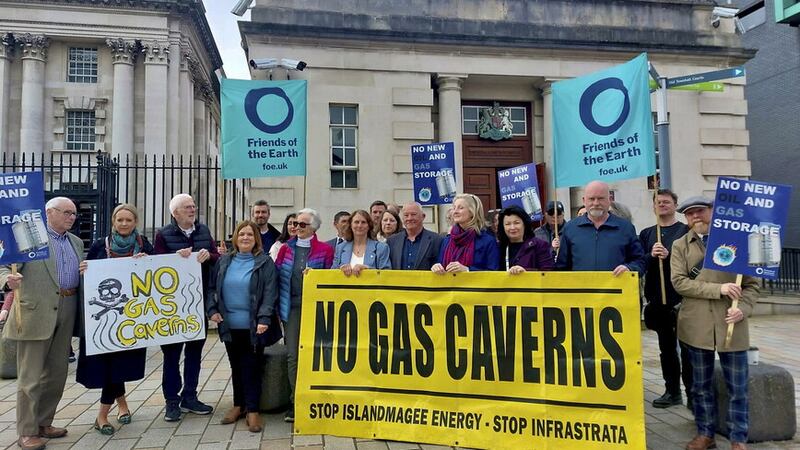A major new undersea gas storage project will keep Northern Ireland “locked in” to using fossil fuels for decades beyond a target of achieving net-zero emissions by 2050, the High Court heard on Tuesday.
In the first case of its kind to focus on the implications of climate change, a judge was told former DUP Minister Edwin Poots unlawfully approved the facility at Larne Lough without obtaining consent from Stormont Executive colleagues.
Campaign group No Gas Caverns and Friends of the Earth Northern Ireland are seeking to have his decision to grant a marine licence to build underground units quashed.
In 2021 Mr Poots, then Minister for Agriculture, Environment and Rural Affairs, gave consent for the development by Islandmagee Energy Ltd.
The plans involve carving seven underground caverns by a method known as solution mining.
It is estimated that the facilities, close to where scenes for TV series Game of Thrones were filmed, could provide more than 25 per cent of the UK’s natural gas storage capacity.
Opponents claim the excavation process will lead to hypersaline salt and chemical solution being discharged into the sea in a protected marine area near Islandmagee creating a “dead zone” threatening marine life.
Eleven protected priority species, including harbour porpoise and skate, are found within 100 metres of the discharge point.
With the seabed storage units expected to be fully operating by 2032, counsel for No Gas Caverns and Friends of the Earth told the court they will have a 40-year lifespan.
Conor Fegan argued that the project would have long-term consequences for an emissions target in legislation introduced at Stormont last year.
“It locks (Northern Ireland) in to natural gas usage until the 2070s, much later than the 2050 net-zero requirement in the Climate Change Act 2022 in this jurisdiction,” he said.
During submissions it was claimed that Mr Poots failed to properly consider the environmental implications and substantial energy use of the project.

Mr Fegan also repeatedly contended that the development proposal was so significant, strategic, cross-cutting and controversial that the former Minister was legally required to refer it to the Executive Committee before granting permission.
“Issues concerning marine biology were raised from day one by a number of environmental NGOs and experts in the area,” he insisted.
Concerns raised by the RSPB and other wildlife groups were backed by opposition from Sinn Fein, the Alliance Party, Green Party and at least two Ulster Unionist MLAs, the court heard.
Mr Fegan said: “This is undoubtedly politically controversial when you have parties coming out in objection to an application.”
It was put to counsel by Mr Justice Humphreys that Mr Poots had no doubts about his right to take the decision without tabling the issue at a meeting of the Stormont cabinet.
But the barrister maintained: “We say that view is simply incorrect.
“It should have been referred to the Executive… but there was silence from other Ministers, we don’t have any views from Executive colleagues saying ‘I’m content for you to make that decision’.”
The hearing continues.

